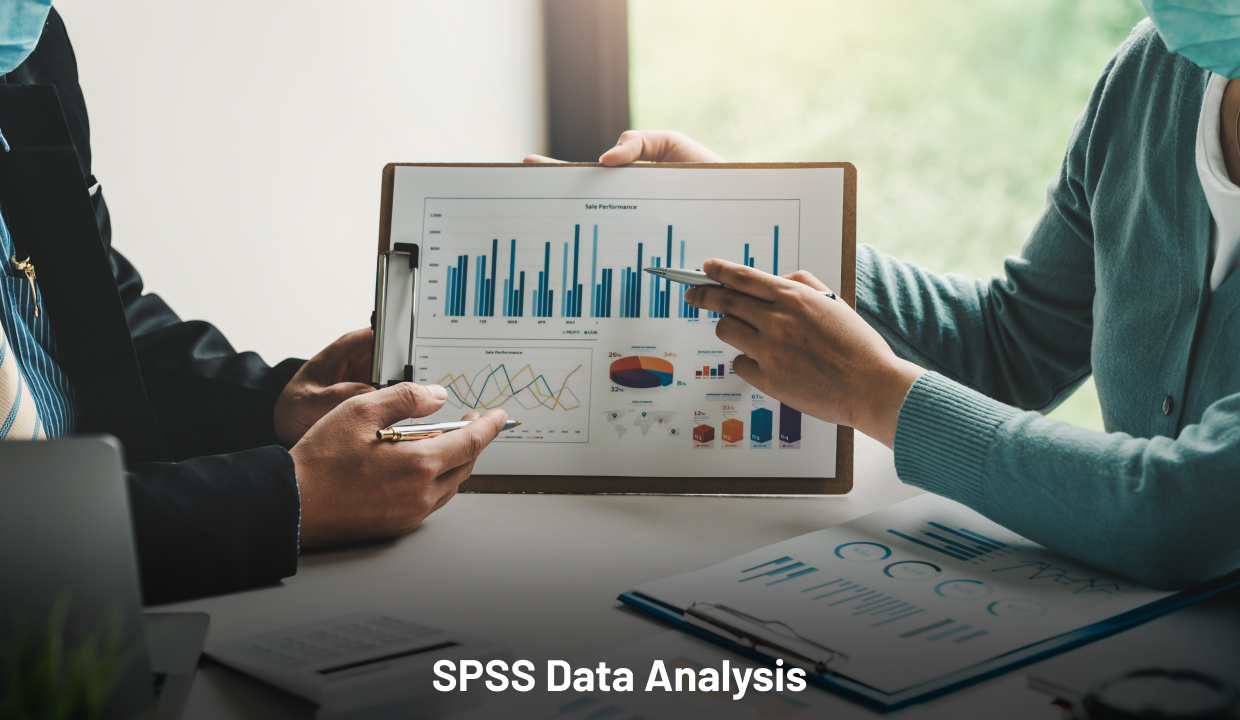-
(+44) 7842798340
Call us for enquiry -
Connect On Whatsapp (+44) 7842798340
Uninterrupted Access 24x7, 100% Confidential. - Connect Now
.jpg)
Any PhD research effort must include data analysis, and using the appropriate tools can significantly improve the rigour and efficacy of your analysis. The statistical package for social science (SPSS) is a similar tool widely utilised in the exploring community. PhD academics can efficiently analyse and interpret their data with SPSS's features. The various methods SPSS help can be used for data analysis and its importance in the dissertation writing setting will be covered in this blog.
Importing data into SPSS is one of the original methods of data analysis. SPSS supports several formats, including Excel- and CSV-like ones and database lines, making it simple for experimenters to import their data for analysis. After importing the data, SPSS offers a variety of tools for data modification. As part of this, variables are recorded, new variables are created based on existing variables, and datasets are used. These features allow PhD students to quickly transform and clean their data to be ready for study. Descriptive statistics play an essential part in recapitulating and understanding the characteristics of the data. Measures of central tendency (mean, standard, mode), dispersion (standard deviation, variance), and frequency distributions are only a few of the descriptive statistics tools offered by SPSS.
These statistics give precious insight into the distribution and variability of the variable under disquisition, helping PhD scholars to gain a comprehensive understanding of their data. Hypothesis testing is an abecedarian aspect of exploration, and SPSS provides a rich set of tools to grease this process. It supports various parametric and non-parametric tests, similar to t-tests, ANOVA, chi-square tests, and correlation analysis. These tests allow experimenters to assess the significance of the connection between variables, determine the differences between groups, and describe patterns in categorical data. SPSS also provides a stoner-friendly interface for conducting these tests, making it accessible to druggies with varying situations of statistical moxie.
Many PhD exploration projects use regression analysis substantially, and SPSS has great capabilities in this field. Whether you're performing simple direct or advanced multiple retrogression analysis, SPSS provides intuitive features to guide you through the process. It allows druggies to specify dependent and independent variables, assess model fit and induce retrogression portions and significance tests. These tools enable PhD scholars to dissect connections between variables, identify predictors, and interpret their findings well.
Additionally, SPSS offers a variety of sophisticated statistical techniques, many of which are particularly useful for PhD research. These include factor analysis, cluster analysis, structural equation modelling ( SEM), and more. These allow experimenters to claw deeper into their data, uncover underpinning patterns, identify idle structures, and test complex theoretical models. By taking advantage of these advanced ways, PhD scholars can increase the depth and complication of their data analysis, thereby contributing to advancing knowledge in their separate fields.
SPSS data analysis enables researchers to perform robust statistical analysis, thereby strengthening the credibility and validity of the exploration. Critical analysis gives significance to the arguments and conclusions of the discussion.
With its intuitive interface and pre-built analyses, SPSS streamlines the analysis process, allowing experimenters to interpret results more and formulate perceptive conversations.
SPSS-driven analyses give solid substantiation to support or refute suppositions, thereby strengthening the overall narrative of the dissertation. Data-driven perceptivity enhances the educational impact of exploration.
Researchers can interact with the data through SPSS, testing various scripts and suppositions. This exploratory aspect can lead to the discovery of unanticipated connections and patterns.
SPSS facilitates collaboration among researchers. The same dataset can be worked on and analysed by multiple team members, encouraging multidisciplinary approaches and enhancing research.

A crucial piece of software, SPSS gives PhD candidates a complete set of tools for data analysis. SPSS offers a user-friendly environment for rigorous statistical analysis, from data input and manipulation to descriptive statistics, thesis testing, and retrogression analysis. Also, its support for advanced statistical ways enables PhD scholars to explore complex connections and uncover meaningful perceptivity from their data. By using SPSS effectively, PhD scholars can increase the validity and trustability of their exploration findings, eventually contributing to advancing knowledge in their chosen subjects. If students are stuck with SPSS, they can seek help from SPSS assignment help services. They provide you with deep research for your assignment writing.